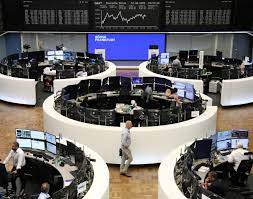Publisher: Maaal International Media Company
License: 465734
European stocks are seeing outsized moves as hedge funds drive trading
اقرأ المزيد
gains and losses in their shares when they report earnings, a Reuters analysis shows, a trend that has more to do with the growing sway of fast money in the $15 trillion market than with business prospects, Reuters reported.
Take the top 60 companies in Europe’s broad STOXX 600 Index: when they reported earnings over the past year, their average daily stock moves were 18% higher than eight years ago, the analysis of more than 120,000 days of share price data from LSEG shows.
The swings on earnings days over the past 12 months were the largest since at least 2016, when compared to average daily moves, the survey shows.
The reasons for this rise in volatility are hard to pin down precisely but stem in large part from the growing dominance of hedge funds that chase trends in search of quick profit, according to interviews with two dozen traders and investors as well as a review of broker research for hedge funds and other sophisticated investors.
“You have mostly short-term money driving the market,” said Krishna Kumar, CIO at Goose Hollow, a macro hedge fund. “So, participants who are not interested in the stock for the next five years but are looking at it for the next five days.”
A dozen of the experts interviewed by Reuters – including equity trading chiefs at three Wall Street firms that say they control about a third of the market – singled out multi-strategy hedge funds, which are among the largest and pursue diverse investment approaches under the same roof, as one of the drivers of the phenomenon.
The influence of hedge funds has been amplified by changes in market structure and the makeup of investors that have thinned the range of participants and trading volumes, according to the interviews and brokerage reports.
Long-term asset managers have poured cash into cheaper funds that simply track indices. And many buy-and-hold investors have left the scene as European economic growth has languished, with Lipper data showing more than half a trillion dollars of outflows from the market since 2016.
Reuters analysed share price volatility back to 2016 in order to capture data since the Brexit referendum that year. New regulations since Brexit have splintered trading across a larger number of markets, some of them private and non-transparent, diminishing volumes and making it easier to influence publicly quoted prices.
“Now you have these situations where stuff can just come get you out of the blue, like oddball post-earnings moves,” said Steve Sosnick, chief strategist at multi-national brokerage firm Interactive Brokers, which processes on average 2.4 million trades per day globally. “That’s a tough environment for stocks.”
As regulations push more financial activity away from the regulated banking sector, the influence of hedge funds is growing across a broad range of financial markets. Reuters reported in March how they were piling into the euro zone’s $10 trillion government bond market.
Asked to comment on Reuters findings, a hedge fund industry representative said the sector plays an essential role in the smooth functioning of markets.
Jack Inglis, chief executive of the trade group Alternative Investment Management Association, said hedge funds make an “integral contribution to deep, diverse, and accessible capital markets and the financing of the EU economy.”
“They do this by providing liquidity, conducting their own research, improving
corporate governance, and undertaking investments which other investors may be reluctant to hold,” Inglis said.








